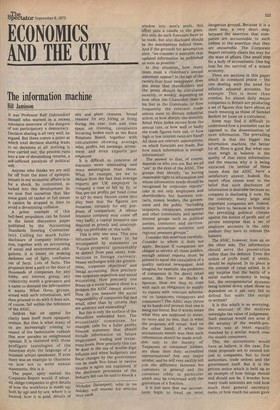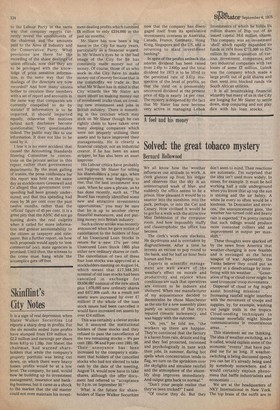ECONOMICS AND THE CITY
The information machine
Bill Jamieson
It was Professor Ralf Dahrendorf himself who warned in a recent television interview of the dangers of tooparticipatory a democracy. Decision sharing is all very well, he argued. But there comes a point at Which total decision sharing leads to no decisions at all: nothing is ever carried out; the process runs into a law of diminishing returns, a self-inflicted paralysis of political will.
Anyone who thinks we are still far off from the state of epileptic seizure in our economic affairs is in for a shock. So committed, so locked into this development do we now find ourselves that like some giant oil tanker at full steam it cannot be stopped in time to avoid a devastating collision.
A prime example of this hell-bent propulsion can be found in the latest discussion paper published by the 'Accounting Standards Steering Committee' (sic). Calling for much fuller disclosure of company information, together with an accounting of social and environmental obligations, it is intent on making darkness out of light, confusion out of facts. Lots of facts. The proposals beat a path to the door of thousands of companies for any lobby, any interest group, any collectivity worth a grievance and a name to demand the information it wants. What these groups, armed with such information, will then proceed to do with it does not, of course, fall within the reference of the ASSC.
Seldom has an appeal for clarity been itself more opaquely written. But that is what many of us are increasingly coming to expect of the fashionable rubbish that now parades as enlightened opinion. It is cluttered with those profligate tautologies of the American style, the language of a business school speakeasy. If ever there was an example to chairmen on how not to write annual statements, this is it.
The paper, aptly named the Corporate Report would, if adopted, oblige companies to give details of how the workforce is made up, both by age and by sex; where it is located, how it is paid, details of site and plant closures, 'broad reasons' for any hiring or firing during the year, cost and time spent on training, complaints involving bodies such as the Race Relations Board, together with calculations showing average., sales, profits, net earnings, investment and even exports per employee.
It is difficult to conceive of statistics more misleading and more meaningless than these.
What, for example, are we to deduce from the fact that average exports per UK employee in company x rose or fell by Cy, or that pre-tax profits per head come to fz? So many factors come into play here that the figures are nonsense, certainly for any pur poses of comparison. A labour intensive company may come off very badly; a capital intensive one depicted as grossly and unacceptably too profitable on this scale.
This is only one area. This new information will have to be accompanied by statements on 'Future prospects' (presumably as distinct from past ones), tran sactions in foreign currency, money exchanges with the government, 'corporate objectives' and 'social accounting.' How precisely one corporate objectives and social accounting. How precisely one draws up a social balance sheet is a problem the ASSC cannot answer. How do you measure the social responsibility of companies big and small, other than by criteria that are arbitrary and misleading?
But this is only the surface of the absurdities embedded here. The accountants' committee, for example, calls for a fuller profits forecast statement that should include information on future employment, trading and investment levels. How precisely this can be done in the era of double-digit inflation and when budgetary and fiscal changes by the government can be made five times in twelve months is again not explained. If the disclosure provisions of the Industry Bill can be said to knock a Nicholas Davenport, who is on holiday, will resume his articles next week. window into men's souls, this effort puts a candle to the glass. Not only do such forecasts have to be made, but also disclosed should be the assumptions behind them. And if the grounds for assumption alter, "we consider it desirable that updated information be published as soon as possible."
In this situation, how many times must a chairman's annual statement appear? In the age of the twenty-four hour newspaper, does this mean that shareholders and the press should be circulated monthly, or weekly, depending on how often the Chancellor rises to his feet in the Commons, or how frequently the relevant trade unions meet to discuss industrial action, or how sharply the monthly Retail Price Index moves from the annual rate, or how well or badly the trade figures turn out, or how high or low interest rates are fixed? All these are relevant assumptions, on which forecasts are made. But how much information is enough information?
The answer to that, of course, depends on who you are. But we all "are" in the eyes of the ASSC. The groups they identify "as having reasonable right to information and whose information needs should be recognised by corporate reports" take in not only employees and shareholders, but business contacts, money lenders, the government and the public "including taxpayers, ratepayers, consumers and other community and special interest groups such as political parties, consumer and environmental protection societies and regional pressure groups."
Consider this assertion carefully. Consider to whom it does not apply. Because if companies are obliged to service all these publics, enough annual reports must be printed to equal the circulation of a quality national newspaper. And imagine, for example, the problems of companies in the direct retail sector, like Tesco or Marks & Spencer. How are they to cope with such an obligation to supply its reports with 'relevant informatin' to 'taxpayers, ratepayers and consumers'? The ASSC may throw up its hands and protest that one is being too literal. But if words mean what they are supposed to mean, no more and no less, that is what the proposals will entail. And on the other hand, if what the accountants meant was that such information should be made available only to the Society of Taxpayers or consumer lobbies, are these then duly accredited representatives? Ask any major retailer, and he will very swiftly tell you the difference between his customers in general and the consumer lobby in particular which may be concerned with the grievances of a fraction.
It is just here that our accountants begin to tread on most dangerous ground. Because it is a . short step, a very short step, between the assertion that com panies are accountable to such lobbies to the assertion that they are answerable. The Corporate Report certainly clears the way for the state of affairs. One small step for a body of accountants. One big leap for the survival of a mixed economy.
There are sections in this paper which do command praise — the one dealing with the need for inflation adjusted accounts, for example. This is more than overdue, for almost daily major companies in Britain are producing a set of figures that have about,as much meaning as those of Samnel Beckett let loose on a calculator.
Some may find it difficult _to understand how a journalist can be opposed to the dissemination of more information. The prevailing theory is that the bigger the information machine, the better for all. More is good. But what one must weigh in balance is the quality of that extra information and the reasons why it is being extracted. On neither of these issues does the ASSC have a satisfactory answer. Indeed, the report often comes near to the belief that such disclosure of information is desirable because no company is disclosing it now. On the contrary, many large and important companies are. Indeed, they have to, because so hostile is the prevailing political climate against the notion of profit and of private enterprise that a set of employee accounts is the only medium they have to redress the balance.
The ASSC, however, lines up on the other side. The information should serve the prosecution rather than the defence. Even the notion of profit itself, it seems, should be replaced. In its place is the concept of value added. Is it any surprise that the battle of a social market economy is being lost, the entrepreneurial dynamic being howled down when those so dependent on it not only fail to defend but want the script re-written?
It is this which is so worrying; the mistrust of the motives outweighs the value of judgement. Such mistrust would not arise if the scrutiny of the wealth-producers was at least equally matched by a similar watch over the wealth consumers.
This, the accountants would have us believe, is the case. For these proposals are to extend not just to companies, but to local authorities, trade unions and the government itself. But it is the private sector which is held up as an example of how things should and should not be. I wonder how many trade unionists are told how much their general secretary earns, or how much his union gave to the Labour Party in the same way that company reports currently reveal the emoluments of the chairman and the amounts paid to the Aims of Industry and the Conservative Party. What provisions are there for the recording of the share dealings of union officials, now that they are to be privileged with the knowledge of price sensitive information, in the same way that the dealings of the directors are now recorded? And how many unions bother to circulate their members with a set of report and accounts in the same way that companies are currently compelled to do by statute? If information is to be imparted, it should imparted equally, otherwise the motives behind such disclosure become questionable. Very questionable indeed. The public may like to use information. It does not like to be used by it.
I fear it is no mere accident that caused the Accounting Standards Steering Committee to concentrate on the private sector in this report rather than government departments. By the most galling of ironies, the press conference for this report was held on the same day as stockbrokers Greenwell and Co alleged that government overspending had been grossly understated; and that this spending had risen by 56 per cent over the past twelve months, rather than the 'official' figure of 45 per cent. It is a great pity that the ASSC did not go hunting down the real culprits when it called for more information and greater accountability to the citizen as taxpayer and ratepayer. But a further report, on how such proposals would apply to 'non commercial' (sic), state agencies is promised. Until then, the witness to the crime must hang while the accomplice gets off free.



































 Previous page
Previous page